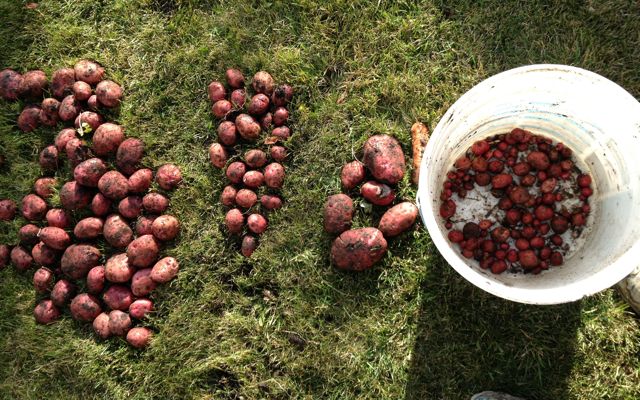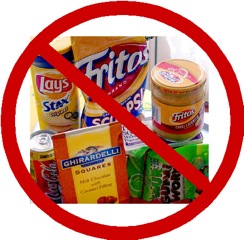1) things people eat.
2) things people eat that nourish, sustain or supply substances to sustain growth, repair and propel vital processes and to furnish energy.
Sadly Definition One is how most people think about food. If it’s edible, it’s food. Edible seems to mean if it doesn’t kill you immediately or in the short term, it’s okay to eat.
I prefer the second definition but if we use it as a ruler, the majority of what we eat falls short of food. We tend to eat a lot of what I like to call “unfood”.
Unfood is edible in that it doesn’t cause immediate death. Unfood is usually heavily processed and denatured of its nutrients. Unfood often includes substances created in labs to enhance, smell, taste, mouth-feel and shelf-life of the product. The body doesn’t know how to process these chemicals so it sequesters them into fat cells or reacts to them with aches, inability to sleep and other disorders.
Sadly, our first inclination is to reach for more poison: over-the-counter painkillers and sleeping pills, which further add to the toxic burden our bodies bear.
Look at the labels on the packaged food in your pantry. Are there words you can’t pronounce? I suggest you look them up online. Find out what other uses there are for these chemicals to determine whether eating them is a good idea.
Real food doesn’t require dozens of chemicals. Bread is a great example of how our food has been adulterated. Real bread requires five basic ingredients: flour, sugar, salt, water and yeast. Gourmet breads may include eggs, milk, and seeds.
But check out the label on your favourite bread. Subway has over 50 ingredients in its bread. A recent news story touted Food Babe’s victory in convincing Subway to remove one chemical from its bread. Big Deal. It’s a start but it seems rather like “lip service”. “We care about your health so we are removing X to lull you into forgetting about the other 40-some questionable ingredients!”
Chemicals are used to cover up the stench of processed food, which is often made with inferior ingredients. Pink slime, a lab concoction of proteins captured from slaughterhouse waste, is washed in ammonia before being added to patties, nuggets, sticks, and other forms of “pre-chewed” meats.
There is an entire industry manufacturing and marketing grain-based foods, most of which are corn-based. These foods are evil on many levels:
- 90% of corn in North America is GMO. In studies (except those conducted by GMO companies) consumption of GMO foods led to gastro-intestinal issues and higher cancer rates.
- Much of this corn is fried in GMO oils like corn, soy, canola and cottonseed oil. Frying creates acrylamides and other toxic substances and consuming them leads to Omega acid imbalances. (They’re all too high in Omega 6 vs Omega 3.) And they’re GMO.
- These foods are a major source of empty calories. Digesting food is an enormously energy-sucking process for the body. To achieve optimum health and reduce stress on the body, it is best to eat high-nutrient foods.
- Grain has been used to fatten animals for centuries, millennia. Why do we think a grain-based diet (which is the recommendation of the USDA Food Pyramid and the Canada Food Guide) is NOT going to make US fat?
There is plenty of unfood in our grocery baskets. Soft drinks are a significant portion of the family grocery budget but they do not nourish or sustain or supply anything. In fact they rob your body of calcium and other minerals. They are most likely loaded with GMO High Fructose Corn Syrup, an evil sweetener, which is manufactured using dry cleaning fluid and mercury. Even if they contain sugar, it is GMO if it’s made with sugar beets and all that sugar (9.5 tsp per can of Coke) steals vitamins and minerals from the body.
A lot of people assure me they’re fine because they avoid sugar, opting instead for artificial sweeteners. Little do they know that diabetes has skyrocketed, in part because of the prevalence of artificial sweeteners. The body simply doesn’t know what to do with these strange chemicals.
Before food gets to the factory (or supermarket) it can be contaminated with dozens of chemicals, namely pesticides, insecticides, herbicides and other substances designed to kill things. The Environmental Working Group releases a yearly list of the most polluted fruits and vegetables called The Dirty Dozen. These are the most heavily sprayed food crops and one is prudent to choose organic versions of these. They also have a list of the Clean 15, those foods least likely to be sprayed.
I’ve never understood the “out of sight, out of mind” mentality of ignoring the consequences of toxic chemicals in food. I also don’t understand consumers’ blind trust of the system and their tolerance of governments, obviously in cahoots with powerful food lobbyists. These organizations care about money, not the health and wellness of their customer.
Sometimes it all seems hopeless. 100 years ago all food was organic. Now we have to pick our way through food minefields. Tragically, most of us won’t know until it’s too late that we’ve been poisoned by our food.
What can you do?
- Grow as much of your own food as you can.
- Get to know your farmers.
- Buy ingredients, not products made with ingredients.
- Choose organic products whenever you can.
- Ask for organic products from your store managers. Create a demand for clean food.
- Vote with your dollars, supporting local, organic, and ethical food.
- Be prepared to pay more for quality food.
Moving away from unfood is a process. It won’t happen overnight. But your health and your world will reap the benefits of your intention to banish unfood forever.


